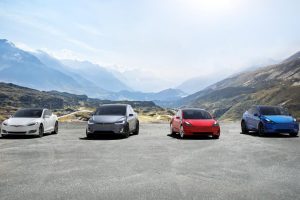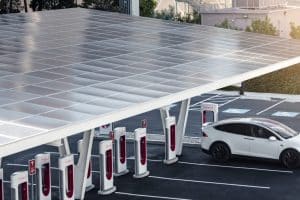- 📊 Tesla Model Y dominates Australia’s electric vehicle segment in 2023, selling an impressive 28,769 units.
- 🚗 Overall, Tesla achieves remarkable sales in Australia, reaching 46,116 units for the year 2023.
- 🥇 Model Y becomes the 6th best-selling vehicle in Australia in 2023, irrespective of fuel type.
- 🌏 Australia’s electric vehicle sector experiences substantial growth, with battery electric vehicles accounting for 7.2% of new vehicle deliveries, up from 3.1% in 2022.
- 📈 Tesla holds a notable market share of 3.79% in the overall Australian auto market in 2023.
- 🚙 In the broader automotive landscape, the Ford Ranger claims the top spot with 63,356 units sold in 2023, followed by the Toyota Hi-Lux and other traditional models.
- 💡 Federal Chamber of Automotive Industries (FCAI) chief executive Tony Weber notes a significant increase in the market share of electrified vehicles, reaching 16.2% when including hybrids and plug-in hybrid vehicles.
- 🌧️ Warning of potential challenges, Weber acknowledges the impact of rising interest rates, inflation, and high energy bills on Australia’s auto sector in 2024.
- 📉 Despite the potential challenges, the growth and success of electric vehicles, particularly Tesla’s Model Y, highlight a shifting trend in Australia’s automotive preferences.
- 🌐 The data underscores the increasing importance of electrification in Australia’s automotive market, paving the way for further advancements in the electric vehicle sector.
In the vast expanse of Australia’s automotive landscape, a notable transformation is underway, marked by the remarkable performance of electric vehicles, particularly the Tesla Model Y. The year 2023 witnessed an electrifying surge in Tesla’s sales, positioning the Model Y as the beacon of change in the Australian automotive sector. Let’s delve into the intricacies of this groundbreaking shift and its implications for the future of driving down under.
Unveiling the Triumph: Tesla Model Y’s Dominance
In a standout achievement, the Tesla Model Y emerged as the undisputed leader in Australia’s electric vehicle segment for the year 2023. With an impressive 28,769 units sold, the Model Y not only dominated the electric vehicle realm but etched its name as a formidable force in the broader automotive market.
1. Overall Tesla Sales Soar
- 🚗 Tesla, as a brand, achieved a remarkable feat, clocking in a total of 46,116 units sold in Australia during 2023.
2. Model Y’s Impressive Ranking
- 🥇 The Model Y secured the 6th position in Australia’s best-selling vehicles for 2023, irrespective of fuel type, showcasing its widespread appeal.
Electric Revolution: Australia’s Shifting Landscape
The success of the Model Y mirrors a broader trend reshaping Australia’s automotive preferences, with a substantial increase in the adoption of electric vehicles.
1. Electric Vehicle Growth
- 🌏 Australia’s electric vehicle sector experienced noteworthy growth, with battery electric vehicles claiming a 7.2% share of new vehicle deliveries in 2023, a significant jump from the 3.1% share in 2022.
2. Tesla’s Market Share
- 📈 Tesla’s notable market share of 3.79% in the overall Australian auto market for 2023 underlines the increasing acceptance and demand for electric vehicles.
A Glimpse into the Automotive Hierarchy
While the Model Y shines in the electric category, the broader automotive hierarchy in Australia continues to showcase familiar names.
1. Top-Selling Vehicles
- 🚙 The Ford Ranger clinched the top spot in Australia’s best-selling vehicles for 2023, boasting 63,356 units sold.
2. Traditional Models Hold Ground
- 🏆 Traditional models like the Toyota Hi-Lux, Isuzu D-Max, Toyota Rav4, and the MG ZS followed suit, highlighting the coexistence of conventional and electric vehicles.
Tony Weber’s Insights: Navigating Challenges and Opportunities
Tony Weber, chief executive of the Federal Chamber of Automotive Industries (FCAI), provides valuable insights into the evolving landscape and potential challenges.
1. Market Share of Electrified Vehicles
- 💡 Weber notes a significant increase in the market share of electrified vehicles, reaching 16.2% when hybrids and plug-in hybrids are included.
2. Foreseeing Challenges in 2024
- 🌧️ Weber cautions about potential challenges in 2024, citing rising interest rates, inflation, and high energy bills that might impact Australia’s auto sector.
Charting the Course for the Future
Despite the looming challenges, the success of electric vehicles, particularly the Tesla Model Y, underscores a shifting trend in Australia’s automotive landscape. As electrification gains momentum, it paves the way for further advancements and sets the stage for a future where sustainable driving takes center stage.





